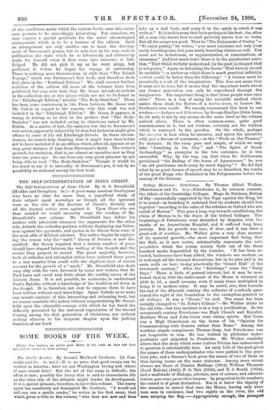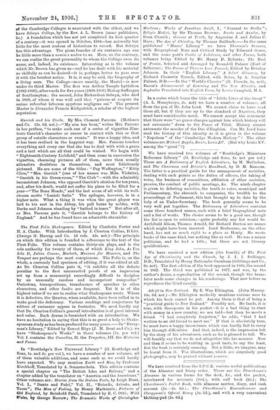College Histories : Peterhouse. By Thomas Alfred Walker. (Hutchinson and
Co. 5s.)—Peterhouse is, by common consent, the oldest of the Cambridge Colleges. Hugo de Balsham, Bishop of Ely—successfully supported by the Pope against the King, let it be noted—in founding it ordained that its students should live together "according to the rules of the scholars at Oxford who are called of Merton." This goes a long way towards establishing the claim of Merton to be the doyen of the Oxford Colleges. The beginnings of Peterhouse were disturbed by disputes with the monks of an Augustinian Hospital, and it suffered long from poverty. But its growth was sure, if slow, and it can show a great roll of worthies. Mr. Walker gives a very clear account of its material growth,—the most important fact being that the Hall, as it now exists, substantially represents the aula perpulchra which the young society built out of the three hundred marks bequeathed by the founder. "It has been re- roofed, buttresses have been added, the windows are modern, as is well-nigh all the internal decorations, but in its plan and in its main walls we have to-day practically the 'Grand Hall' of the thirteenth century." After the "Buildings" come the "Early Days." There is little of general interest, but it may be men- tioned that in 1545 the endowment of the House is returned at £138 Sc. Id., a small revenue, even if many times multiplied to bring it to modern value. It may be noted, also, that towards the end of the fifteenth century the collector of a subsidy ques- tioned the right of the foundation to the exemption granted to all Colleges. It was a "House," he said. The name has been recently changed to "St. Peter's College "—Mr. Walker sticks to the old title—but this incident is in a way a justification. In the seventeenth century Peterhouse was High Church and Royalist. Matthew Wren and John Cosin were ruling spirits. But Cosin was a High Churchman on the terms of his "Opinion for Communicating with Geneva rather than Rome." Among the worthies stands conspicuous Thomas Gray, but Peterhouse was not hospitable to him. He was bullied by philistine under- graduates and migrated to Pembroke. Mr. Walker candidly allows that the story which some zealous Petrine has endeavoured to question is substantially true. An early Life of the poet gives the names of three undergraduates who were parties to the prac- tical joke, and a Bursar's book gives the names of two of them as then having rooms on the same staircase. Among more recent alumni are those of Charles Babbage (1814), William Thomson (Lord Kelvin) (1845), P. G. Tait (1852), and E. J. Routh (1854), and a multitude of Bishops, scholars, men of science, and adminis- trators quosnune perseribere ion gum. In proportion to its numbers, the record is of great distinction. Nor is it below the dignity of the occasion to record that once the House, having only nine- teen men in residence, had two eights on the river, the odd man carrying the flag.—.Appropriately enough, the youngest of the Cambridge Colleges is associated with the oldest, and we 'have Selwyn College, by the Rev. A. L. Brown (same publishers, 6s.) A foundation which has not yet completed its first quarter of a century—it was opened in October, 1884—has naturally but little for the most zealous of historians to record. But Selwyn has this advantage. The pious founder of six centuries ago can The little more than a nominis umbra to us. Here, on the contrary, we can realise the great personality to whom the College owes its name, and, indeed, its existence. Interesting as is the volume which Mr. Brown has given us—and he has dealt with his material as skilfully as can be desired—it is, perhaps, better to pass over it with the briefest notice. It is, it may be said, the biography of a living man. The College—more exactly, the Hostel—is now under its third Master. The first was Arthur Temple Lyttelton (1882-1893), afterwards for five years (1898-1903) Bishop Suffragan of Southampton; the second, John Richardson Selwyn, who died in 1898, of whom it was well said that "patrem ut corpore ita animo referebat laborem appetens negligens sui." The present Master is Alexander Francis Kirkpatrick, a scholar of the highest reputation.















































 Previous page
Previous page